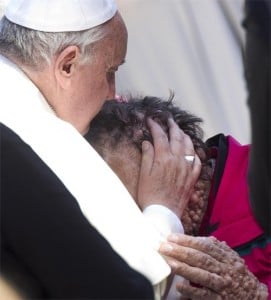Kathy Escobar has a thought-provoking post today. In it she writes:
it’s easier to default toward bondage than freedom.
i will go so far to say that we have a fatal attraction toward control & power (not a crazy-boil-bunnies-fatal-attraction, but a propensity to keep going back to what’s not good for our souls).
we like leaders who kick ass & take names, who tell us what to do and what to believe, who set the record straight and speak for God, who use shame to motivate, who keep us in line.
we want kings to rule over us.
we prefer the outward appearance of real strength to humility.
we choose charisma over integrity.
we repeat bad relationships instead of learning how to create good ones.

I resonate with this experience. For years I struggled with God. Who was this God of the Scriptures who at one moment seemed so loving and kind and then at the next moment so ruthless, jealous, and angry? The vicious part of God is what I most identified with. Over the past few months when I was entering Orthodoxy I thought about his a lot. When I was a Protestant it would seem that I could find and highlight this loving and kind God in a more accessible way. After all we had the bible in the pews and a more egalitarian clergy.
I tried but I couldn’t shake the angry God who was watching my behavior and holding me by a thread over the pits of hell. Even if everything in the church said one thing, everything I knew (or thought I knew) about God was different. It was as if the entire church world became a sacrament of this angry God. Grace was God’s way of keeping me from hell rather than as a means of loving me as I am.
Drew you had better just be grateful that God doesn’t loose you from that thread. That’s God’s grace keeping you from eternal torment.
Even adopting a more liberal/progressive theology didn’t help. Once we invest ourselves in a culture loaded with symbols of meaning, it’s very hard to break free. Can we just invest different meaning in the color red when it points to incorrect answers, stop signs, and blood? The same is with ritual, church architecture, church governance, and so forth. All of these elements point to fundamental ideas about God. No matter how hard I struggled to invest new meaning in these symbols, they were still there.
In a CNN report about ex-Catholics this quote is telling:
“It’s like a spiritual tattoo that you receive as a kid,” Viarrial says. “Those roots don’t ever disappear, you just better try to understand them.”
What I needed was a totally different place. I needed a vision of God that was not my own. I needed a God I couldn’t make in my own image or rely on the images and ideas loaded with an idea of God I didn’t believe. I found that in Orthodoxy. This was the most radical departure from anything I had experienced in the church save perhaps for a few Charismatic churches mainly in the Church of God in Christ.
Isn’t ironic that the practice of Christianity with the most images present in the very architecture of the worship space is also the one place where I found myself freed of my own images of who God is? In that setting I found myself filled with new meaning rather than filling God with my meaning. Orthodoxy turned my faith upside down.
Something ugly became something liberating and beautiful. With God’s grace I had broken the cycle of abuse.











